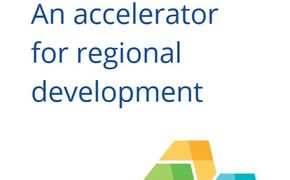On 3 February 2022, the Interreg Europe Policy Learning Platform held an online webinar on 'Collection and recycling of plastic waste'.
Plastics are versatile materials used widely for packaging and across a variety of industry sectors, such as building and construction, automotive and electronics. Their production is predicted to double by 2040 compared to current levels. However, plastic production, use and discharge are still “linear”, with less than 6% of plastics being recycled. Almost 26 million tonnes of plastic waste are generated in Europe each year. Today, plastic waste is mostly incinerated, exported or landfilled and often ends up in the environment. Through the implementation of an ambitious political agenda (Green Deal, European Plastics Strategy, Single Use Plastic Directive, etc.), Europe is thus determined to halt plastic pollution by addressing single-use plastic items, separate collection, recycling, littering and more.
The webinar presented policy measures and circular approaches from the Interreg projects CAPONLITTER, INTHERWASTE, REPLACE and PLASTECO to improve the collection and recycling of plastics waste in line with the European agenda, aiming to inspire local and regional authorities.
Webinar recording
Webinar agenda
Moderation and concept by Astrid Severin, Thematic Expert for Environment and resource efficiency.
00:04:46 Introduction presentation to the topic and the recently published policy brief on halting ocean plastics pollution by Astrid Severin.
00:09:28 Presentation by Jack McQuibben on the state-of-the art collection and recycling strategies for plastics waste
00:25:47 Q&A: Do you think it's realistic that plastic packaging are going to be recycled by 2030?
00:27:50 Q&A: Many companies are currently looking at redesigning plastics. What regulations are in place to accommodate this and are there any requirements for types of plastics?
00:32:56 Presentation by Kerttu-Liina Urke and Eliis Kuus on the 'Packaging Deposit Refund System'
00:47:06 Q&A: Have you been looking at expanding the packaging types?
00:49:07 Q&A: Do you think the system is only working at a national basis or can, for example, also islands use this system?
00:51:20 Presentation by Mirko Kruse the good practice: 'Hamburg Bottle: introducing a closed loop of plastics'
01:02:16 Q&A: How has it been with Unilever? Have they thought about implementing this in other places as well? Who is responsible for the kick-off for such a project?
01:03:44 Q&A: Does the project only cover non-food grade PET products?
01:07:55 Presentation by Gregoire Thonier on the financial policy to support the use of recycled plastics.
Panel discussion
01:23:23 Q&A: What are the three main recommendations for regions and municipalities if they want to start similar projects or how to tackle the plastic challenge.
Key learnings
In his keynote speech, Jack McQuibban from Zero Waste Europe talked about the challenges of plastic waste collection and recycling. Using examples of good practices, he provided several recommendations that can help tackle the plastic waste: establishing ambitious public procurement guidelines, introducing and promoting reuse solutions (the reusable containers have 13x and reusable cups have 4x lower environmental footprint), introducing deposit return systems and implementing strong recycling & collection systems (door-to-door collection and pay-as-you-throw proven to be most effective). Priority should in most cases be given to prevention and reuse.
Examples provided by Jack can be found below:
- CAPonLITTER project
- Paris example
- Refill in the UK
- The case study of Unverpackt
- Jean Bouteille story
- Billie Cup
- The case of Schleswig-Holstein (in German)
- The quality collection point ‘Het goed’ (in Dutch)
- How to sort properly (in Czech)
- Rethink Plastic Alliance
- Seas at Risk
Deposit return systems are a great method for collection of both reusable and single-use packaging. Kerttu Liina Urke and Eliis Kuus demonstrated that in a case study of the Estonian deposit return system for beverage packaging. The Estonian deposit system has reached collection rates of 90% for PET bottles, 95% for cans and 86% for one way glass, in 2020. The collection rates in 2021 were a bit lower due to the COVID-19 pandemic. The system emphasises closed-loop bottle to bottle recycling and has an additional project focused on collection of reusable cups. Deposit return systems are currently up and running in twelve EU countries, with Slovakia and Latvia being the most recent ones, starting the operation in January 2022.
Relevant links:
Closed loop systems are the best way of recycling. A case study from Hamburg shows that such closed loop system can be developed on a regional scale. The “Hamburg bottle” is collaborative project with Unilever, where detergent packaging is produced from locally collected plastic waste. Other regions and cities are already interested in implementing a similar solution in their area.
High collection rates are not enough when it comes to recycling. There has to be proper sorting of different types of plastics, enough recycling capacities and most importantly, use of recycled content in new products. France has a plan to recycle 100% of plastics by 2025. Gregoire Thonier introduced the webinar participants to ORPLAST, a robust financial incentive policy supporting recyclers, modernisation of sorting plans and incorporation of recycled plastics in manufacturing of new products, which should help France to reach its ambitious goal.
The webinar closed with a lively panel discussion and questions from the audience. The speakers highlighted several key takeaway points to tackle the problem of plastic waste:
- Prioritise prevention over recycling;
- Provide functional and effective separate collection systems that are easy to understand and convenient to use for citizens;
- Enhance stakeholder involvement;
- Provide economic incentives;
- Analyse the situation and act, start locally, also with small projects;
- Make companies accountable for example through the use of EPR schemes;
- Build public awareness on how and why to recycle.
The participants have had the opportunity to vote on potential future topics for policy learning services (Survey open until 15 February 2022).









